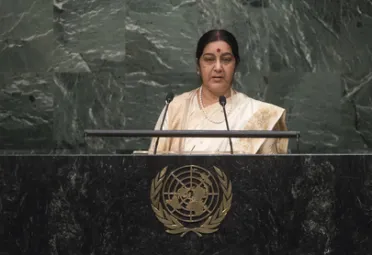Statement
Statement summary
Sushma Swaraj, Minister for External Affairs of India, noting the Organization’s numerous successes such as assisting in the decolonization and dismantling of apartheid, combatting global epidemics and reducing global hunger, stressed that that the United Nations had been ineffective in the area of peace and security. She called for the urgent reform of the Security Council as a prerequisite for preserving the “centrality and legitimacy of the [United Nations] as the custodian of global peace, security”. The African and Latin American continents should be amongst the Council’s permanent members and more developing nations should be included in its decision-making structures.
Turning to peacekeeping, she underscored India’s role as a troop-contributing country, noting that it had some 8,000 military and police personnel participating in 10 United Nations missions. Therefore, it was a matter of concern that there was no role for troop contributing countries in the formulation of mandates, which were often amended without consultation — a clear violation of Article 44 of the Charter. Peacekeepers faced great risks, including terrorism. That threat could only be defeated by organized international action. Countries that provided financing to terrorists or safe havens for their training, arming and operations must pay a heavy price at the hands of the international community.
Calling for a comprehensive convention on international terrorism, which had long been entangled in disputes over the definition of “terrorism”, she said there could be no distinction between a “good” or “bad” terrorist. In that vein, she turned to her country’s relationship with Pakistan, stressing that no one should accept terrorism as a legitimate instrument of statecraft. Past assurances between the countries had not been honoured and new cross-border terrorist attacks had recently taken place. “We all know that these attacks are meant to destabilize India and legitimize Pakistan’s illegal occupation of parts of the Indian State of Jammu and Kashmir,” she said.
Even as the world countered the menace of terrorism, she continued, it must acknowledge that real social and economic progress remained a critical goal. The elimination of basic human want would lead invariably to more peaceful societies. In regards to climate change, the world had a duty for common action but that it must keep in mind the larger historical contribution of some and the differentiated responsibility of others. In addition, adapting lifestyle choices and reducing extravagant consumption would help the world correct its course. Turning finally to the current refugee crisis, she said that a swift response backed by political will was the “need of the hour”. India’s own response to humanitarian crises in its neighbourhood had been quick and holistic. Whether the refugees came from Nepal or Yemen, India had emerged as a net security provider.
Full statement
Read the full statement, in PDF format.
Photo

Previous sessions
Access the statements from previous sessions.
